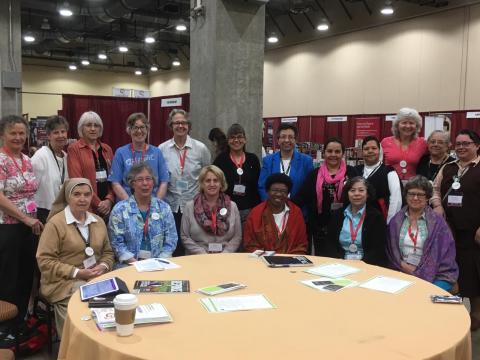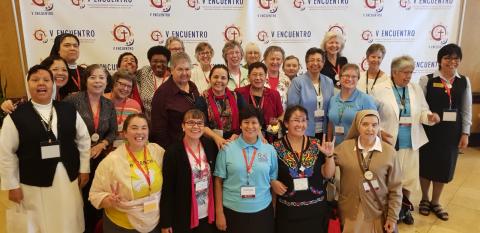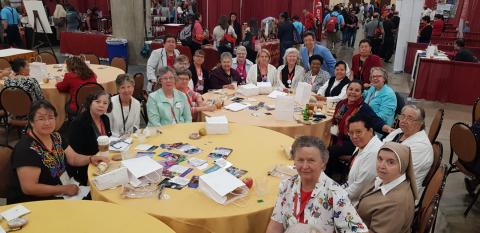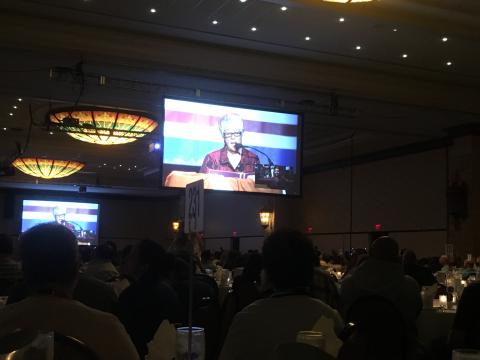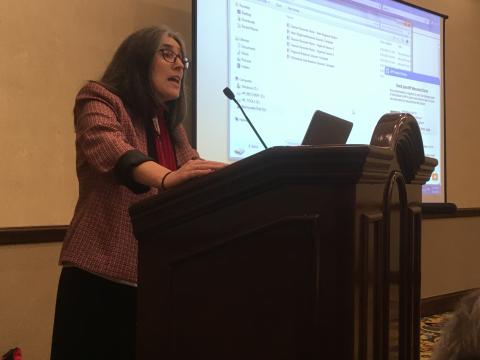A 16-member delegation from LCWR attended the national V Encuentro held from September 20-23 in Grapevine, Texas.
The gathering, which drew more than 3000 invited delegates from dioceses and Catholic organizations throughout the United States, was the culmination of a four-year consultation with the Hispanic Catholic community. Hispanics now comprise 40 percent of US Catholics, and 60 percent of those who are younger than 18.
The goal of the Encuentro process was to provide an opportunity for Hispanics to organize, assess their needs, and assume leadership. More than 100 bishops were present to hear the ideas and concerns of the Hispanic people directly.
Thirteen of LCWR’s 15 regions had representatives present among the LCWR delegation. The regional representatives will share reflections on what they learned at the Encuentro with their regions.
Below are brief reflections on the experience from some of the LCWR delegates.
Cyndi Nienhaus, CSA -- Region 9
Because of my work at a Catholic university where I teach a number of DACA students, I was cognizant of the presence of fear with which many Hispanics and others on the peripheries must live on a daily basis. I left Encuentro wondering how does the Catholic Church and we, as vowed religious women, address and help alleviate the fear people face in society and in the church. The refreshment of song and dance and prayer and genuine encounter with one another I experienced at Encuentro reminded me that fear cannot hold us back from proclaiming the reign of God, especially among DACA students and among those who have difficulty in remembering that all people are made in the image of God.
Anna Marie Reha, SSND -- Region 11
The enthusiasm and commitment of the Latino young adults who participated in the V Encuentro touched me deeply. During one of the response sessions Juan Pablo Padillo, Coordinator for Youth and Young Adult Ministry in the Archdiocese of Chicago, spoke clearly and forcefully about the needs of Latino young adults as he challenged the bishops and the Church to be inclusive of women, provide solid formation and space for Hispanic/Latino leadership, and create budgets that reflect these priorities. How can we, women religious, reach out to support and collaborate with young people who are committed to being missionary disciples?
Kristine Vorenkamp, SLW -- Region 8
Not having been on the national scene of the Encuentro or a part of the Encuentro process even on the diocesan level I was amazed, inspired and deeply grateful for what I can now understand as a true hope for the People of God on a leadership level for our country.
There would be so much to share, especially regarding the youthful leadership that is ripe to share their gifts in many areas, but I would just like to share a couple of the messages given:
- Archbishop Gustavo, from San Antonio, began with asking forgiveness on the part of the Bishops. I understand that about 130 bishops were there...I hope they came away with hope in the midst of this darkness, because any group that could be so filled with hope at this time in the church is truly a gift.
- Cardinal Tobin's message was to look to Paul, who was prevented from places on his journey, so he continued to look to see where the Spirit was leading him. Tobin's message: don't worry about strategies. Go where the Spirit is going.
- Lastly, the message that stays with me is from Papal Nuncio Pierre: Don t get discouraged. Look at the parable of the wheat and the weeds...keep discerning. Keep asking: What is God planting? Beginnings are not always discernible. Pope Francis says that patience is a mark of holiness.
There was a dirth of women in the liturgies, which were otherwise very wonderful. But I felt that the women who participated in the panels, and the diocesan level break-outs were outstanding.
Rosemarie Abate, HVM - Region 7 -- From Being the Hidden People of the 1960s
The LCWR Assembly’s reflection on the Trinity and confirmation of our confrontation of racism, concretely was evidenced at Encuentro V as the US Hispanics moved from being the hidden people of the 1960s to being missionary disciples giving a new birth to the US church in these times. The ambience, the conference mood and the interplay spoke of a young, committed, familial church ready to reach out and accompany the immigrant, the unchurched, the 2nd generation Hispanic youth, and the Euro-centered church.
The relationship of culture and faith is as important today as it always has been. How can religious congregations use their voice on hospital boards and school/college committees or to diocesan and parish hiring practices that evidence an awareness of a Catholic Church, that embraces its Hispanic members and culture?
Verónica Esparza Ramírez, OP -- Region 14 -- Discípulos misioneros, testigos del amor de Dios
El V Encuentro, fue una experiencia intercultural e intergeneracional. Encuentro de culturas como resultado de un peregrinaje de fe en la iglesia, en el que fue necesario escuchar profundamente y respetar desde los contextos, ministerios y voces. Encuentro intergeneracional en el que aprendimos unos de otros, los jóvenes y los no tan jóvenes se unieron en una sola voz cantando y celebrando “Nuestra Alegría está en el servicio, nuestra misión es evangelizar, nuestra cultura es del encuentro, con nuestro Dios y la humanidad.” ¿Cómo LCWR experimenta ser intercultural e intergeneracional a nivel local y nacional? ¿Cuáles serían acciones específicas para dar seguimiento al V encuentro con respecto a los jóvenes y al pueblo latino en los ministerios de mi Congregación? ¿Cómo experimento ser discípulo misionero desde el role que desempeño?
Missionary Disciples: Witnesses of the Love of God
The Fifth Encuentro was an intercultural and inter-generational experience. It was an encounter of cultures resulting from a pilgrimage of faith in the church in which it was necessary to listen profoundly and respectfully to different ministries and voices. It was an intergenerational encounter in which we learned from one another; youth and the not so young united in one voice singing and celebrating, "Our joy is in service, our mission is evangelizing, our culture is encounter with our God and humanity." How does LCWR experience itself being intercultural and inter-generational at the local and national level? In the ministries of my Congregation, what will be specific actions to give follow-up to the Fifth Encuentro with respect to youth and Latinos? How do I experience being a missionary disciple in the role that I carry out?
Donna Marie Gribschaw, CDP - LCWR Global Concerns Committee Member
The hearts of many people are hearing the Holy Spirit’s invitation to open the door! The signs of the times are clear as we hear the cries of our sisters and brothers in the United States and throughout our global community. Our Latino(a) brothers and sisters are ready to open the door to accompany others: to stop, listen, embrace, and cry with the People of God. Bishop Flores’ invitation to stop and contemplate the Face of God in those we see spoke to me of a way in which we all can aspire to be Missionary Disciples. As we journey together, let us first see the Face of God in one another! Together we risk the Sacred Journey of Presence as we contemplate the Face of God in those we accompany!
Ana Lydia Sonera Matos, CDP -- Region 4
Cardinal Tobin touched my heart with his words and led me to wonder how we should respond to the Hispanic/Latino population of our church community who make up about 40% of current members. He said: “At this historical moment, where is God opening a door? We need to allow ourselves to be led by the sense of where God is actively opening doors and put our initiative and energy there. We need to trust that somehow our actions will generate the resources needed to implement the dream being unlocked. We will have to review the structures and strategies and ask if they are what the mission requires of us now at this moment of the church’s history.” Where is the Holy Spirit calling us, women religious, to open doors to be present as mentors and companions? We are able to go forth to reach out to those on the peripheries creating structures that support mentoring and leadership programs, spiritual formation programs and study programs to assist our Hispanic/Latino brothers and sisters to further develop their gifts and talents.
Eileen Haynes, SCL -- Region 13
During the V Encuentro, a snapshot of the richness of our Church was presented to me: a diversity of age, religious life, educational levels, prayer and worship styles, etc. I was reminded of the many ways that God is present to us and works through us. I was also struck that there are many ‘doors’ that are waiting to be opened: 1) formation (young adults, calling the ordained and others who serve in leadership positions to grow and enter into intercultural understanding, openness to other forms of prayer and worship), 2) sharing of resources across parish and diocesan boundaries, 3) expanding the willingness to truly listen and accompany one another.
I truly hope that we, as Church, and specifically as LCWR, continue to grow in understanding of what it means to be Church. We (ordained, vowed, single, married, Hispanic, African-American, Asian, Caucasian etc) need to walk together. We need to begin listening – truly listening – to one another which implies reaching out to one another. In a particular way, I hope that we reach out and support the young Latina women as they search for a place to be respected and have their voices heard.
Annmarie Sanders, IHM -- LCWR Director of Communications
A new birth is happening in the nation and the church brought about by the warmth, hospitality, tenderness, and gentleness that the Latino people bring. This insight of Cardinal Blasé Cupich sparked images for me of what the future might look like if there were a true embrace and integration of the Latino cultures in the United States. Surely our present culture is crying out for new ways of living together as a nation and global community. Might this full integration of cultures be a way forward? What will it take for us personally and communally to allow this integration to be transformative? What role might women religious play in this integration on local and national levels?

